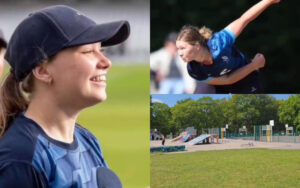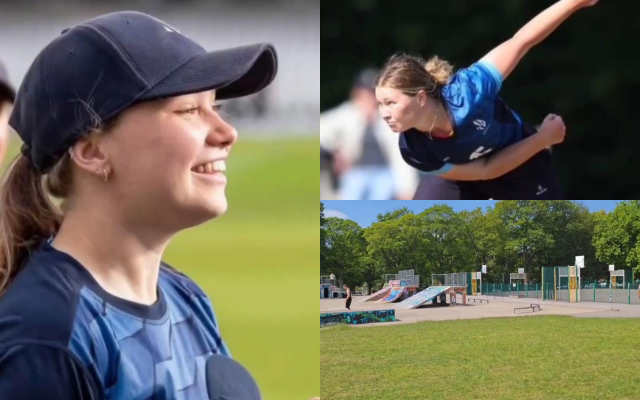
Trisha Ghosal in Leeds
Hyde Park, Leeds. It’s not a stadium. There are no dugouts, no flashing scoreboards. Just open space, quiet resilience, and untold beginnings. These are the fields where young girls swing bats too big for their frames and bowl with more heart than form. These are the invisible roots of women’s cricket.
Grace Hall didn’t grow up playing here. But the spirit of Hyde Park is where her story belongs. At just 22, Grace has already done more for the future of women’s cricket in Yorkshire than many do in a lifetime.
Her journey began outside Leeds, playing mostly with boys at local clubs where she was often the only girl. The system didn’t make room for her, so she made her own space. At just 15, she was travelling 45 minutes just to find a girls’ team. Instead of quitting, she decided no other girl should have to go through what she did.
So, she built something. The Clifton Park Cobras, York’s first senior women’s cricket team. What started with sheer determination is now a thriving, competitive side, offering a home to cricketers who once had nowhere to go. Today, the Cobras are climbing league tables, developing new talent, and proving that ambition planted in the grassroots can bear powerful fruit.
Grace now represents Yorkshire and is part of the Northern Diamonds setup. But what truly sets her apart is how deeply rooted she remains in community cricket. She mentors younger players, speaks at grassroots events, and continues to champion access and opportunity for girls across the region.
For More Exciting Articles: Follow RevSportz
🚨 Trisha’s Bench View 📹
She didn’t wait for permission. At 15, Grace Hall travelled 45 minutes just to play.
At 22, she’s built a team, sparked a movement, and joined a global sisterhood of trailblazers.
From Hyde Park to Yorkshire, this is the story of building women’s… pic.twitter.com/4pVW9yzQtR
— RevSportz Global (@RevSportzGlobal) June 18, 2025
Grace’s journey is a vivid echo of the countless unsung heroines who have, brick by painstaking brick, built the foundations of women’s cricket worldwide. From the pioneering women who, in countries like England and Australia, first dared to pick up a bat in the late 19th and early 20th centuries, often facing societal scorn and limited resources, to those in emerging cricketing nations today, the narrative remains strikingly similar.
These trailblazers, regardless of their age or geography, didn’t wait for permission or perfect facilities. They scrounged for equipment, convinced reluctant groundskeepers, and coached with boundless enthusiasm, all to create spaces where women and girls could play. Theirs was a silent battle, fought not on grand pitches, but in dusty schoolyards, community fields, and local parks – much like Hyde Park in Leeds. They created leagues from scratch, organised impromptu matches, and tirelessly advocated for recognition, laying the groundwork for the professional sport we see today.
Grace Hall, with her unwavering commitment to the Clifton Park Cobras, embodies this indomitable spirit, joining a global sisterhood of women who refused to accept the status quo, and instead, willed a future into existence for the generations of female cricketers who would follow. Her story, though unique in its specifics, is a powerful testament to the universal truth that progress in women’s sport has always been, and continues to be, forged by individual acts of courage, community building, and an unshakeable belief in the power of a bat, a ball, and a dream.
So, the next time you see a girl in a park with a bat in hand, don’t dismiss it. That patch of grass could be where the next revolution begins. Just like Grace. Just like cricket.
Also Read: Memorialising and fandom in Leeds, and a Virat Kohli room




